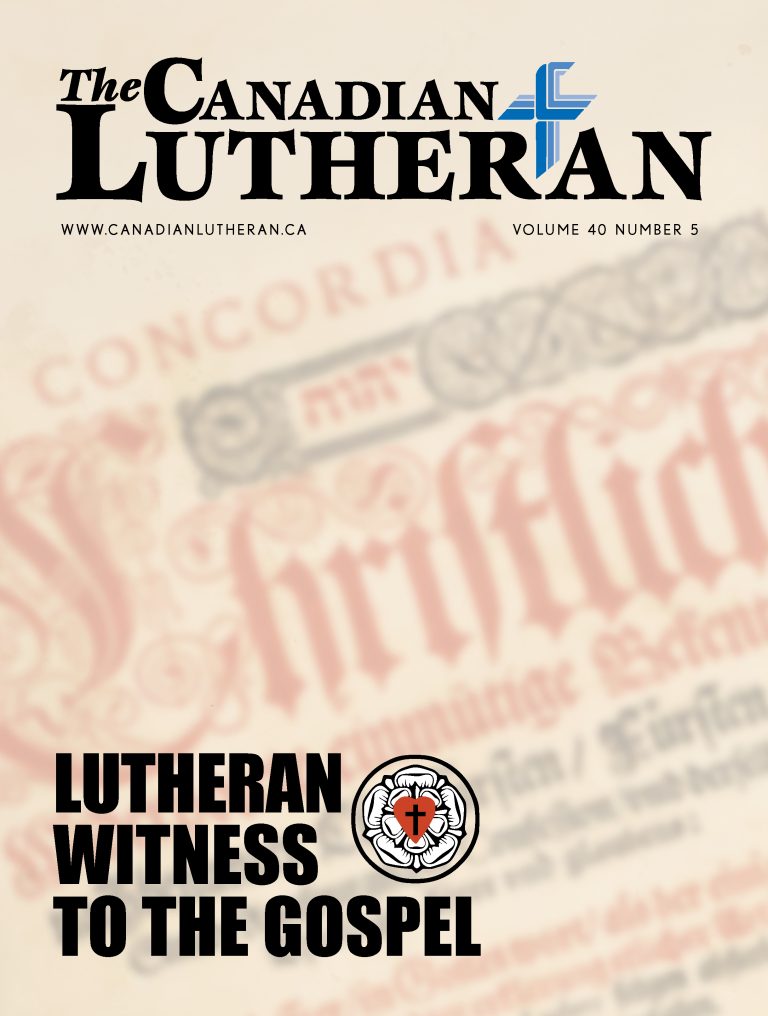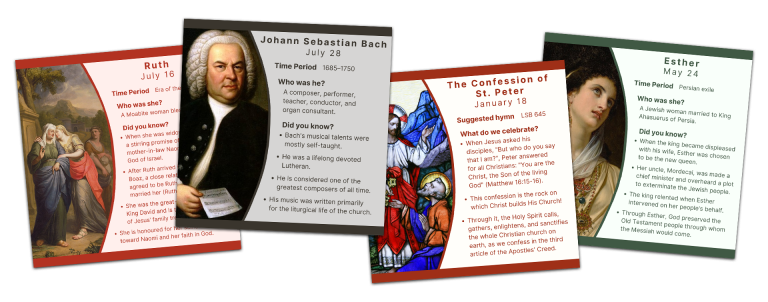Doctor’s appointment: up close and personal with Martin Luther
Compiled by Ian Adnams
The fifty-five volumes of Luther’s Works contain Dr. Luther’s Bible commentaries, sermons and essays. Volume 54 is called “Table Talk” and contains notes taken by guests and visitors to his home as they bantered opinions during meals. Rather than discourses from Luther the Theologian, Table Talk are words from citizen Luther—a man known for his strong opinions, common language, earthy illustrations and deep love for his wife and family. These words are not those upon which Lutherans base any doctrine or confession. They are Luther’s personal opinions and thoughts.
Using excerpts from Luther’s Works, Volume 54 (Fortress Press 1967) we have constructed an interview with Dr. Luther to provide insight into his character and personality.
Q: Dr. Luther, let’s begin with your family. You married a former nun, Katharina von Bora and have a home full of children. How would you describe your life with all the things you have going on?
A:I am very busy. Four persons are dependent on me, and each of them demands my time for himself. Four times a week I preach in public, twice a week I lecture, and in addition I hear cases, write letters, and am working on a book for publication. It is a good thing that God came to my aid and gave me a wife. She takes care of domestic matters, so that I do not have to be responsible for those too.
I wouldn’t give up my Katy for France or for Venice—first because God gave her to me and gave me to her; second because I have often observed that other women have more shortcomings than my Katy (although she, too, has some shortcomings, they are outweighed by many great virtues); and third, because she keeps faith in marriage, that is, fidelity and respect. A wife ought to think the same way about her husband.
At this point during the dinner interview, Dr. Luther’s dog came into the room looking for a morsel from the table. Luther remarked “Oh, if I could only pray the way this dog watches the meat! All his thoughts are concentrated on the piece of meat. He has no other thought, wish or hope.”
Q: Do you struggle with prayer?
A: When we pray we have the advantage [of the promise] that what we ask will be granted although not according to our wish. If it weren’t for the promise, I wouldn’t pray. God does well, moreover, that He doesn’t give us everything as we wish, for otherwise we’d want to have everything on our own terms. That our Lord God is the same in life and death, I have often experienced. If our prayer is earnest it will be heard, even if not as and when we wish. This must be so, or our faith is vain. Consequently, it’s difficult to pray. I know well what prayer requires of me. I have not committed adultery, but I’ve broken the first table [of the Ten Commandments] against God’s Word and honour. On account of my great sins [against the first table], I can’t get to the others in the second table.
Q: What about your Bible reading habits?
A: For some years now, I have read through the Bible twice every year. If you picture the Bible to be a mighty tree and every word a little branch, I have shaken every one of these branches because I wanted to know what it was and what it meant.
A doctor of the Scriptures ought to have a good knowledge of the Scriptures and ought to have grasped how the prophets run into one another. It isn’t enough to know only one part—as a man might know Isaiah, for example—or to know only one topic of the law or of the gospel. Now, however, doctors are springing up who scarcely have a right comprehension of one topic.
Q: What have you learned about the power of God’s Word?
A: So great are the effectiveness and the power of the Word of God that the more it is persecuted the more it flourishes and grows. Consider the Diet of Augsburg which is truly the last trump before the day of judgement. How the whole world raged against the Word… Yet by means of our [Augsburg] Confession, our doctrine and faith were so brought to light that in a very short time the Confession was sent, at the emperor’s command, to all kings and princes. In their courts were many distinguished and talented men who took to this teaching like tinder and afterward set fire [to others] everywhere. Thus, our Confession and Apology were made known with great honour, while the Confutation [Rome’s reply] gathers dust in the dark.

Luther, right, administers The Lord’s Supper serving both the bread and the wine, a practise based upon Scripture.
Oh, how I wish that their Confutation were better known. How we’d like to fall upon that old, ragged parchment and shake it so that the pieces would be scattered to and fro! But they hate the light and won’t come out. We offered them sufficient peace and unity there, but in their arrogance they were unwilling to assent. Accordingly, they must be allowed to perish without mercy. So one reads in Joshua 9 that Joshua offered peace to all the cities, that none except Gibeon accepted it, and that all the others perished without mercy.
That Diet [in Augsburg] is therefore deserving of all praise. Nobody should regret what it cost because the Word of God was spread abroad contrary to the intention of all people, of the emperor, of the pope, etc. They wanted to extinguish it, but the blaze grew and spread.
Q: And what about the preachers of God’s Word. What do you say to them?
A: First, you must learn to go up to the pulpit. Second, you must know that you should stay there for a time. Third, you must learn to get down again. When I have nothing more to say, I stop talking.
A preacher is like a carpenter. His tool is the Word of God. Because the materials on which he works vary, he ought not always pursue the same course when he preaches. For the sake of the variety of his listeners he should sometimes console, sometimes frighten, sometimes scold, sometimes soothe, etc.
One should preach about things that are suited to a given place and given persons
In my preaching I take pains to treat a verse of scripture and to stick to it, and so to instruct the people so they can say ‘That’s what the sermon was about.”
When Christ preached, He proceeded quickly to a parable and spoke about sheep, shepherds, wolves, vineyards, fig trees, seeds, fields, plowing. The poor lay people were able to comprehend these things.
One should preach about things that are suited to a given place and given persons. A preacher once preached that it’s wicked for a woman to have a wet nurse for her child, and he devoted his whole sermon to a treatment of this matter although he had nothing but poor spinsters in his parish to whom such an admonition didn’t apply. Similar was the preacher who gave an exhortation in praise of marriage when he preached to some aged women in an infirmary.
Q: You are known for writing and preaching in rather bold terms. Why is this?
A: Our Lord God must precede a heavy shower with thunder and then let it rain in a very gentle fashion so that the ground becomes soaked through. To put it differently, I can cut through a willow branch with a [bread] knife, but to cut through oak requires an axe and wedge and even with these one can hardly split it.
Phillipp [Melanchthon, a fellow reformer] stabs too, but only with pins and needles. The pricks are hard to heal and they hurt. But when I stab, I do it with a heavy pike used to hunt boars.
God wishes us well with His whole heart. He who has given His Son for me certainly doesn’t want to kill us
Q: God’s grace is at the centre of our Christian faith, but unbelievers don’t understand what it is.
A: It’s very difficult for a man to believe that God is gracious to him. The human heart can’t grasp this. What happened in my case? I was once terrified by the sacrament carried by Dr. Staupitz (Vicar-General of the Augustinian Order in which Luther was a monk) in a procession on the feast of Corpus Christi (body of Christ). I went along in the procession and wore the dress of a priest. Afterward, I made confession to Dr. Staupitz, and he said to me ‘Your thought is not of Christ.’ With this word he comforted me well. This is the way we are. Christ offers himself to us together with the forgiveness of sins, and yet we flee from his face.
This also happened to me as a boy in my homeland when we sang in order to gather sausages (begging for food). A townsman jokingly cried out ‘What are you boys up to? May this or that evil overtake you!’ At the same time he ran toward us with two sausages. With my companion, I took to my feet and ran away from the man who was offering his gift. This is precisely what happens to us in our relation with God. He gave us Christ with all His gifts and yet we flee from Him and regard Him as our judge.
The interview concluded in Luther’s garden. We walked past a bird’s nest and the birds flew away. Dr. Luther said “Dear little bird, don’t fly away. I wish you nothing but good. If only you’d believe me!” Then he turned away from the nest and said “This is how we should believe God—that He wishes us well with His whole heart. He who has given His Son for me certainly doesn’t want to kill us.”
Ian Adnams is editor of The Canadian Lutheran and www.canadianlutheran.ca





